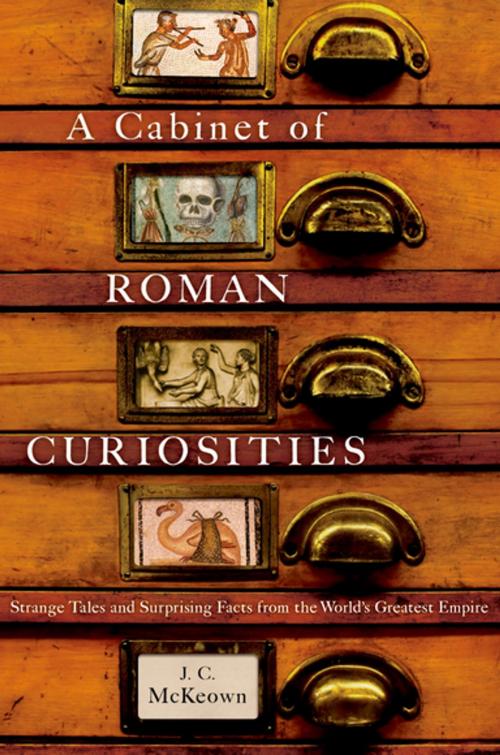A Cabinet of Roman Curiosities
Strange Tales and Surprising Facts from the World's Greatest Empire
Fiction & Literature, Literary Theory & Criticism, Ancient & Classical, Nonfiction, History, Ancient History, Rome| Author: | J. C. McKeown | ISBN: | 9780199752782 |
| Publisher: | Oxford University Press | Publication: | June 1, 2010 |
| Imprint: | Oxford University Press | Language: | English |
| Author: | J. C. McKeown |
| ISBN: | 9780199752782 |
| Publisher: | Oxford University Press |
| Publication: | June 1, 2010 |
| Imprint: | Oxford University Press |
| Language: | English |
Here is a whimsical and captivating collection of odd facts, strange beliefs, outlandish opinions, and other highly amusing trivia of the ancient Romans. We tend to think of the Romans as a pragmatic people with a ruthlessly efficient army, an exemplary legal system, and a precise and elegant language. A Cabinet of Roman Curiosities shows that the Romans were equally capable of bizarre superstitions, logic-defying customs, and often hilariously derisive views of their fellow Romans and non-Romans. Classicist J. C. McKeown has organized the entries in this entertaining volume around major themes--The Army, Women, Religion and Superstition, Family Life, Medicine, Slaves, Spectacles--allowing for quick browsing or more deliberate consumption. Among the book's many gems are:
· Romans on urban living: The satirist Juvenal lists "fires, falling buildings, and poets reciting in August as hazards to life in Rome."
· On enhanced interrogation: "If we are obliged to take evidence from an arena-fighter or some other such person, his testimony is not to be believed unless given under torture." (Justinian)
· On dreams: Dreaming of eating books "foretells advantage to teachers, lecturers, and anyone who earns his livelihood from books, but for everyone else it means sudden death"
· On food: "When people unwittingly eat human flesh, served by unscrupulous restaurant owners and other such people, the similarity to pork is often noted." (Galen)
· On marriage: In ancient Rome a marriage could be arranged even when the parties were absent, so long as they knew of the arrangement, "or agreed to it subsequently."
· On health care: Pliny caustically described medical bills as a "down payment on death," and Martial quipped that "Diaulus used to be a doctor, now he's a mortician. He does as a mortician what he did as a doctor." For anyone seeking an inglorious glimpse at the underside of the greatest empire in history, A Cabinet of Roman Curiosities offers endless delights.
Here is a whimsical and captivating collection of odd facts, strange beliefs, outlandish opinions, and other highly amusing trivia of the ancient Romans. We tend to think of the Romans as a pragmatic people with a ruthlessly efficient army, an exemplary legal system, and a precise and elegant language. A Cabinet of Roman Curiosities shows that the Romans were equally capable of bizarre superstitions, logic-defying customs, and often hilariously derisive views of their fellow Romans and non-Romans. Classicist J. C. McKeown has organized the entries in this entertaining volume around major themes--The Army, Women, Religion and Superstition, Family Life, Medicine, Slaves, Spectacles--allowing for quick browsing or more deliberate consumption. Among the book's many gems are:
· Romans on urban living: The satirist Juvenal lists "fires, falling buildings, and poets reciting in August as hazards to life in Rome."
· On enhanced interrogation: "If we are obliged to take evidence from an arena-fighter or some other such person, his testimony is not to be believed unless given under torture." (Justinian)
· On dreams: Dreaming of eating books "foretells advantage to teachers, lecturers, and anyone who earns his livelihood from books, but for everyone else it means sudden death"
· On food: "When people unwittingly eat human flesh, served by unscrupulous restaurant owners and other such people, the similarity to pork is often noted." (Galen)
· On marriage: In ancient Rome a marriage could be arranged even when the parties were absent, so long as they knew of the arrangement, "or agreed to it subsequently."
· On health care: Pliny caustically described medical bills as a "down payment on death," and Martial quipped that "Diaulus used to be a doctor, now he's a mortician. He does as a mortician what he did as a doctor." For anyone seeking an inglorious glimpse at the underside of the greatest empire in history, A Cabinet of Roman Curiosities offers endless delights.















